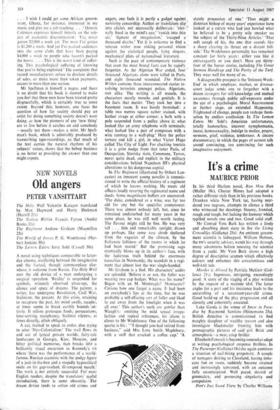NEW NOVELS
Old angers
PETER VANSITTART
The Holy Well Valentin Katayev translated by Max Hayward and Harry Sliukman (Harvill 21s) The Nation Within Francis Fytton (Ambit Books 21s) The Regiment Andrew Graham (Macmillan 25s) The World of Jeeves P. G. Wodehouse (Her- bert Jenkins 30s) The Lemon Eaters Jerry Sohl (Cassell 30s) A novel using techniques comparable to latter- day cinema, oscillating between the imaginative and the factual, though commonplace else- where, is welcome from Russia. The Holy. Well uses the old device of a man undergoing a surgical operation. 'Reality' is suspended for symbols, minutely observed close-ups, the silence and space of dreams. The patient, a writer, has undergone Revolution, Civil War, Stalinism, the present. At this crisis, straining to recapture the past, his mind swells, recedes, at times seems to break earthly bounds en- tirely. It relives grotesque feuds, persecutions, time-serving, sycophancy, Stalinist vileness, at times directly, often obliquely.
A cat, trained to speak to order, dies trying to utter 'Neo-Colonialism.' The trail flows in and out of lyrical private worlds, fairy-tale landscapes in Georgia, Kiev, Moscow, and bitter political memories, then breaks intcY a brilliantly visual excursion to Kennedy's us where 'there was the performance of a world- famous Russian eccentric with the pudgy figure of a jack-in-the-box and a stupidly hypocritical smile on his gap-toothed, ill-tempered mouth.' The work is not entirely successful. For most English readers, despite the translators' useful introduction, there is some obscurity. The dream device tends to soften old crimes and angers, one feels it is partly a gadget against surviving censorship. Author or translators slip into clichés not necessarily deliberate: 'efer-''4_, natty fixed in the mind's eye,' vanish into thin air,' figment of imagination,' escaped a thousand deaths.' Yet it is welcome to find a veteran writer now risking personal vision against the statistical people, lying slogans„ mechanical plots of nationalised literature.
Such is the pace of contemporary violence that even the most brutal facts can be rapidly forgotten. As the Algerian War ended, four " thousand Algerians alone were killed in Paris, and eight thousand wounded. The Nation Within contains three interconnected stories in- volving terrorists amongst police, Algerians, OAS alike. The writing is all muscle, the characters mostly mouths and genitals. It is the facts that matter. 'They took her into a basement room. It was barely furnished: a table two metres square rather stained, with leather straps at either corner; a bath with a pole suspended from a pulley above it; what looked like an army telephone with terminals; what looked like a pair of compasses with a wire running to a wall-plug.' Here the police torture and kill a girl, in what Victor Hugo called The City of Light. For clucking tourists it is a grim nudge from that inner Paris, of Occupation, Stavisky riots, Commune, Terror, never quite dead, and explicit in the military considerations behind Napoleon III's physical alterations to his dangerous capital.
In The Regiment (illustrated by Osbert Lan- caster) an innocent young novelist is commis- sioned to write the official history of a regiment of which he knows nothing. He meets old officers loudly revering the regimental name and deeds. Some magnificent buffers are uncovered. 'The duke, considered as a wine, was far too old for any but the specialist connoisseur: There was almost nobody left, but, since he remained undisturbed for many years in the same place, he was still well worth tasting. The flavour might still be fine. He was very tall . . . thin and remarkably upright; drawn up perhaps, like some rare shrub sheltered from the vagaries of the climate, by the Italianate loftiness of the rooms in which he had been reared.' But the promising saga eventually blows up in its author's face, with the ludicrous truth behind the enormous casualties in Normandy, the scandals in a regi- ment that almost lost the war single-handed.
Mr Graham is a find. His characters"asides are splendid. 'Believe it or not, the fuller was wearing two cap badges. What was his name? Began with an M. Monteagle? Montacute? Curious how one forgot a name. It had been on everybody's lips at the time, but he was probably a self-effacing sort of fuller and liked to cut away from the limelight when it was all over.' This author's teeth are gentler than Waugh's: omitting the mild sexual irregu- larities and topical references, his idiom is closer to Mr Wodehouse. One of the following quotes is his: '"I thought you had retired from business," said Mrs Lora Smith Maplebury, with a sniff that cracked a coffee cup.' A stately procession of one: 'Thus might a dideesah bishop of many years' experience have looked at a curate who had just bowled what he believed to be a pretty wily sneaker On the subject of the Thirty-Nine Articles.' That soft cough of his, the one that sounds like a sheep clearing its throat on a distant hill- side.' The Wodehouse personality has remained constant for forty years: either you like it extravagantly or you don't. Here are thirty- four of the Jeeves stories, including The Great Sermon Handicap and The Purity of the Turf. They wear well for many of us.
A disagreeable prospect is the 'Intimate Week- End' in which employer, mother, or divorce- cottrt judge sends one to forgather with a dozen strangers for self-knowledge and mutual awareness through public self-exposure under the eye of a psychologist. Moral Rearmament at further stage, an extended Happening. Frightened of change, people can reshape them- selves by endless confession. In The Lemon Eaters Mr Sohl's American unfortunates, totally humourless, Uncover nymphomania, incest, homosexuality, indulge in malice, prayer, sermons, grief, violence, tenderness. A sincere documentary, in which the pages of earnest talk sound convincing, too convincing for such imaginative enjoyment.






























 Previous page
Previous page